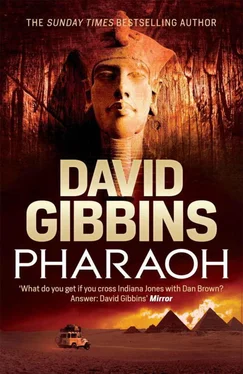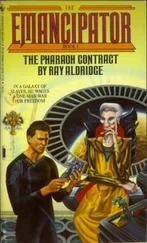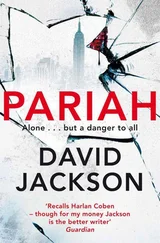Mayne whispered under his breath: please God finish him now . A single bullet, a single spear; there were enough of them flying around. But still Gordon was there, untouched, standing with his feet planted apart facing across the river, facing Mayne. The dervishes had fallen back in a wide arc below the stairs in front of him, their spears raised, standing their ground even while the remaining Sudanese soldiers still fired into them, until they too went silent, their ammunition presumably expended. Then Mayne saw why the dervishes had stopped: two emirs on horseback had ridden through the throng, and stopped below the balcony. They seemed to be reading something to Gordon, talking to him. Mayne felt himself stop breathing. They were trying to take him alive.
He was going to have to do it.
He put down the telescope and raised the rifle, cocking it and setting the trigger. He peered down the sights, finding the mosque, dropping infinitesimally below and to the right until he found his mark. He could no longer see detail, but he was aiming at what he knew was there, a tiny splash of red, drawing his mind towards it as if he were looking through the telescope.
His throat was dry, and his stomach felt cavernous. He realised that he was shivering, that he had not registered the cold. But it was more than that. He had suddenly lost focus. This had never happened to him before . He knew that it was Gordon, that he should never have gone to see him, should never have allowed himself to know his target as a human being. And they had got it all wrong: Gordon was no messiah, nor a martyr in waiting. He was a man who had come back to Khartoum to find something, and who would not leave until he had discovered it. The Gordon he had been sent to kill was a fantasy in the minds of others. When he returned he would tell them, and that false Gordon would be extinguished, and his mission would be done.
Charrière had picked up the telescope. ‘He’s in full view,’ he said urgently. ‘The steamers are coming. Take the shot now.’
Mayne felt himself tighten up again. They were hunters, and he had the deer in his sights, just like the first time as boys when Charrière had talked him through it, settled his nerves. He closed his eyes for a split second, sending himself back to that day beside the lake in the forest, then opened them, seeing nothing but the tunnel of the sights and the target beyond. And then in his mind’s eye he saw Gordon as he should be, Gordon as he might be right now, never allowing himself to be taken prisoner, lifting his revolver and firing his last round at the emir, then charging down the stairs with his sword raised, hacking and stabbing until he was cut down.
He touched the trigger. The rifle jumped, there was a crack and the report echoed down the Nile. He dropped it, and pushed away from the wall, sitting up on his knees and shutting his eyes. He slowly exhaled, feeling as if he would never need to breathe again. He felt the thirst he had first felt in the desert with Shaytan, the thirst that felt like dust in the throat, only this time he did not want to quench it; he wanted the desert to be part of him. He began to breathe again, shallow breaths, barely perceptible, and he opened his eyes. On the horizon over Omdurman to the west he saw the strip of orange widen, wavering and shimmering between sand and sky. Gordon had been right: the sun would shine today. The noise that he had somehow blocked out since aiming the rifle suddenly came back in full force, a din of shrieking and musketry and claps of artillery fire. The city was heaving with dervishes, and he could no longer see the steps of the palace. He looked down the Nile; the steamers had not yet appeared. He and Charrière would be able to leave before Colonel Wilson arrived, before anyone on the boats saw him and his rifle. It had all gone according to plan.
Suddenly the wind was knocked out of him and he was held in a vicelike grip from behind, his neck pinned back and his right arm pushed up in a half-nelson. He struggled, kicking his legs, but his arm was pushed up further. He felt the breath against his neck, and then saw that the forearm around his neck was brawny and scarred, wearing a braided bracelet. He relaxed, and let himself fall back against the man holding him: it was Charrière. ‘Do you remember how we used to wrestle as boys?’ he said. ‘You always won.’
‘That was when you were my adopted brother, Kahniekahake.’
‘And now?’
‘You have earned that name again today, Eagle Eye. And now you will join our ancestors. Your spirit will fly like a swift arrow towards the sun.’
The grip tightened. His arm was pushed up further and pinned hard against Charrière’s chest, allowing him to release his right arm. Mayne heard the sound of a blade being drawn, and he felt a hard flatness against his own chest. He felt numb, too exhausted for games. ‘What are you doing?’
‘My job.’
Mayne tried to struggle. ‘What do you mean?’
‘ Nobody must know . The final words Wilson spoke to me.’
‘That’s what he told me . And nobody will know. Especially if we leave now, before the steamers arrive.’
‘They are two days downstream. I didn’t see them last night. The gunfire we heard was a small Sudanese garrison in the fort of Omdurman under siege.’
Mayne shut his eyes: this was real. He should have expected it. Wilson would arrive too late. Gordon would be dead, killed by the forces of the Mahdi. Wolseley would withdraw honourably, British prestige saved. People would for ever remember the glorious battle of Abu Klea; Gordon would become a saint.
And nobody would ever know the truth .
He swallowed hard. ‘And why not you? If you know, how can you live too?’
‘Nobody believes an Indian. Especially one living the rest of his life alone on a lake in a forest.’
‘Why?’ Mayne said, suddenly too tired for it all. ‘Why do it?’
‘General Wolseley was always good to my people. And Wilson came to me after my wife and child had died.’
‘Wolseley? Was he in on this?’
‘It was he who presented the plan to Wilson. You were the right man for the job. But even you they could not trust to talk one day.’
Mayne shut his eyes. He realised how little he knew, and how this theatre of war was in reality a play of personalities, twisting and encircling each other like weeds in a current, using history as their stage just as the pharaohs had once used the Nile. There were a few good men: Fred Burnaby was one; General Charles Gordon was another. And there were some who once drawn in would never be allowed to leave, whose price for believing that their cause amounted to something greater was to be left forever as detritus of war.
What he would not tell Charrière was that he had been given the same mission. It was why he had tried to persuade Wolseley to let Charrière go home with the other voyageurs. His revolver, the one he had exchanged with Gordon, was meant to be used against Charrière: it was to be at a time of his choosing, at some place on the return journey where Charrière had ceased to be of use to him. Neither of them was meant to come out of the desert alive.
He could not see Charrière, would never see him now. But he remembered the cold dark eyes, the eyes of a hunter, like his own. He should have known it would end this way. It could only end this way .
‘The bowstring has been released, Charrière. The arrow that will take your spirit is already flying. Soon it will pass between us and you will see the sun.’
He felt himself lifted bodily, felt his gorge rise, a tightness below his chest. He gasped, and then remembered something. ‘My tunic pocket,’ he said, his breathing short. ‘Gordon’s diary, his drawings. Captain John Howard, School of Military Engineering. Will you send it to him?’ He felt the feeling go from his limbs, and his voice weaken. ‘My servant, Corporal Jones … 8th Railway Company. Tell Howard to find him. He’s got something of mine. An artefact. Will you do that for me?’
Читать дальше












